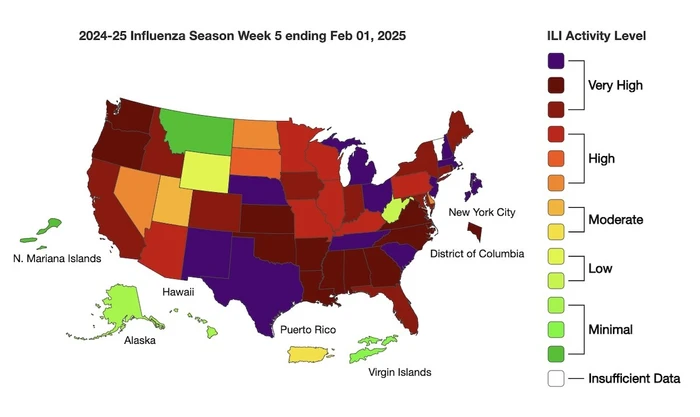If it feels like everyone around you is coughing, sneezing, and complaining about body aches—you’re not imagining it. This winter is officially the worst flu season in 15 years, with outbreaks surging across the country.
According to the Centers for Disease Control and Prevention (CDC), flu-related doctor visits have soared past any peak recorded since the 2009-2010 swine flu pandemic. Right now, 43 states are reporting high or very high flu activity, with some even being forced to close schools and public facilities.
So, what’s causing this intense flu surge, and which states are getting hit the hardest? Here’s what you need to know to stay ahead of the illness.
Flu Cases Are Surging Nationwide
The CDC’s latest report, released on Friday, Feb. 7, confirms that Influenza A(H1N1)pdm09 and A(H3N2) are the predominant strains spreading across the country.
So far, this season has led to staggering numbers:
- 24 million flu illnesses
- 310,000 hospitalizations
- 13,000 deaths, including at least 57 children
The CDC estimates that the total flu-related death toll could climb to 65,000 before the season ends.
While the agency initially classified the 2024-2025 flu season as “moderate” in late January, experts are now calling it unprecedented—largely due to the skyrocketing number of doctor visits for flu-like symptoms. These symptoms include fever, chills, coughing, sore throat, fatigue, and more.
NBC News conducted an analysis showing that outpatient visits for flu-like symptoms are at their highest level in 28 years. And emergency rooms? They’re overflowing.
“My emergency room has been completely full for the last several weeks. There’s no inpatient beds, no ICU beds, and overflow patients are spilling into the emergency department,” said Dr. Randy Joe Hartman, an emergency medicine physician at Baylor Scott & White Medical Center, in an interview with TODAY.com.
Beats Powerbeats Pro 2 Wireless Bluetooth Earbuds – Noise Cancelling, Apple H2 Chip, Heart Rate Monitor, IPX4, Up to 45H Battery & Wireless Charging
The Hardest-Hit States

The latest CDC data reveals that flu cases are spreading most aggressively in the South, Southwest, and Western states. Some of the hardest-hit areas include:
- Texas, Louisiana, New Mexico, and California – Among the highest infection rates in the country.
- Florida – Hospitals are reporting a sharp rise in flu-related ER visits, according to CNN.
- Tennessee – Schools are shutting down due to widespread student and staff illnesses.
- Arizona – Health officials warn that flu hospitalizations are climbing fast.
- New York – Pediatricians report a surge in flu cases, especially among children.
Want to check flu activity in your state? The CDC’s influenza tracker provides up-to-date state and local flu reports.
How to Protect Yourself
No age group is safe from this season’s aggressive flu spread. Dr. Hartman warns that while flu remains the dominant concern, RSV and COVID-19 are still circulating, adding extra pressure on hospitals.
With months left in flu season, staying vigilant is key. Yet, only 44% of Americans received a flu shot this year—the same percentage as last year. Flu vaccination rates for children have dropped from 50% to 45%, making younger populations more vulnerable.
What You Can Do
The CDC strongly recommends that everyone 6 months and older get an annual flu vaccine. If you do get sick, prescription antiviral drugs can help—but they work best when started early, especially for those at higher risk, including:
- Adults over 65
- Children under 2
- Pregnant women
- People with weakened immune systems or chronic conditions
Beyond vaccination, here are some essential flu prevention tips:
✅ Wash your hands frequently – Use soap and water to eliminate germs.
✅ Avoid touching your face – The flu virus enters through your eyes, nose, and mouth.
✅ Disinfect commonly touched surfaces – Regularly clean doorknobs, countertops, and personal devices.
✅ Stay home if you’re sick – As we all learned during the pandemic, limiting contact with others helps stop the spread.
Bottom Line
With flu cases still surging and hospital beds filling up, taking precautions is more important than ever. Stay informed, get vaccinated, and practice good hygiene to keep yourself and your loved ones safe this season.
Want more expert-backed health tips? Stay tuned for the latest flu updates and prevention strategies to help you stay healthy all year long.


